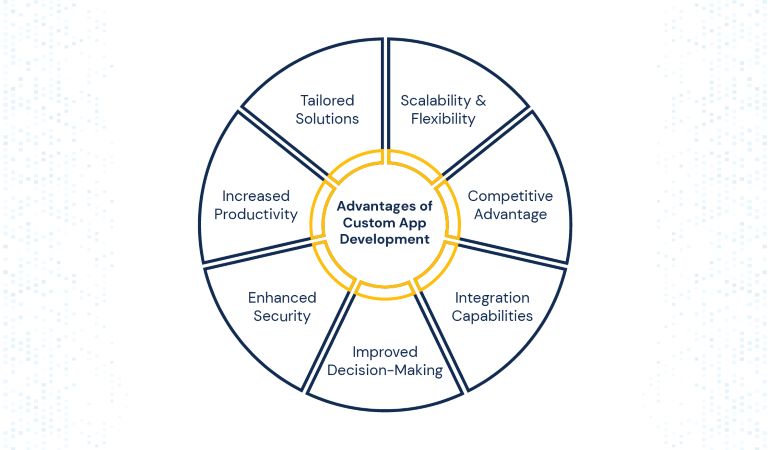Custom app development involves creating software applications tailored to meet specific business requirements. It involves designing, developing, and deploying customized applications to address an organization’s unique needs, workflows, and goals. Custom applications are built from scratch and are not pre-packaged or off-the-shelf solutions.
What are Custom Apps?
Custom applications are specially made-software programs engineered to serve the specific needs and requirements of an individual business or user. Unlike general, ready-to-use software, custom applications are made specifically to solve distinct problems, workflows, and features peculiar to the user.
Custom apps provide custom features, natural integration with legacy systems, and the ability to grow with the user’s requirements. They offer a competitive edge via one-of-a-kind functionalities, even if they take longer and cost more to create.
Understanding Custom App Development
Custom application development involves understanding an organization’s needs and translating those requirements into a functional and user-friendly software application. This includes analyzing business processes, identifying pain points, defining goals and objectives, and designing a solution that aligns with the organization’s overall strategy.
Features of Custom Application Development
Here are some features of custom app development:
-
Straightforward UI
You can construct apps from scratch by simply dragging and dropping dashboard components, which makes it easy for the end user to comprehend your apps.
-
Lucid display
Present data precisely and demarcated with presentation options such as forms, reports, charts, and pages to enhance clarity in reporting data.
-
Intuitive
Edit and polish distinctive apps while on the move with little scripting, either in free-flow mode or through the assisted, drag-and-drop convenience of the Script Builder.
-
Automotive
Prevent mundane work and have more space to innovate. Deluge, the innovative scripting language of Zoho Creator, enables the automation of the most frequent business procedures via simple scripting.
-
Secure
Use roles and permissions to manage access and provide security for users to be present in a solid and secure system.
-
Cross-platform usability
To be more accessible and flexible, create and use applications on various operating systems, such as Android and iOS.
Overview of Custom Mobile App Development
- Requirements Gathering: The initial phase involves collaborating with stakeholders to gather requirements. This includes understanding the business objectives, functional requirements, technical specifications, and user expectations.
- Design and Planning: In this phase, the application architecture, user interface (UI), and user experience (UX) design are created. The design and planning phase ensures the application is intuitive, visually appealing, and aligned with the organization’s branding.
- Development: The development phase involves writing code, implementing functionality, and integrating various components to create the custom application. This phase includes frontend and backend development, database integration, and any necessary third-party integrations.
- Testing and Quality Assurance: Once the application is developed, it undergoes rigorous testing to identify and fix any bugs or issues. This phase ensures that the application functions as intended meets all requirements, and provides a seamless user experience.
- Deployment and Launch: The custom mobile app development is deployed to the production environment after successful testing and quality assurance. This includes setting up servers and databases and configuring the necessary infrastructure. The application is then launched for users to access and utilize.
- Maintenance and Support: Custom applications require ongoing maintenance and support to ensure they remain secure, updated, and optimized for performance. This phase involves addressing issues, providing updates, and implementing enhancements or additional features as needed.
Advantages of Custom Application Development
Here are the top advantages of using a custom application.

-
Tailored Solutions
Custom mobile app development services are designed to meet an organization’s specific requirements. They can be built from scratch, precisely fitting business processes, workflows, and goals.
Example: A logistics company may require a custom application to track shipments, manage inventory, and streamline the supply chain. The application can be customized to match the company’s unique processes and requirements.
-
Scalability and Flexibility
Custom applications can be designed with scalability, allowing them to grow and adapt as the organization expands. They can be easily modified or enhanced to accommodate changing business needs and technological advancements.
Example: A retail business might develop a custom e-commerce platform that can handle growing users, products, and transactions. The application can be designed to scale seamlessly and accommodate future growth.
-
Competitive Advantage
Custom software development provides a competitive edge by enabling organizations to differentiate themselves. They can automate processes, improve efficiency, and deliver enhanced user experiences.
Example: A hotel chain might develop a custom iOS app that integrates a hotel price API, enabling guests to book rooms, request services, and access exclusive offers. By incorporating real-time price comparisons and the best available rates directly within the app, the hotel can offer a highly personalized and cost-effective experience, setting it apart from competitors and enhancing customer satisfaction. This strategic use of technology improves operational efficiency and positions the hotel as a tech-forward choice in the hospitality market.
-
Integration Capabilities
Custom application development services can seamlessly integrate with software systems and third-party tools, allowing for improved data sharing, collaboration, and streamlined workflows.
Example: A healthcare organization may develop a custom electronic medical records (EMR) system that integrates with laboratory systems, billing systems, and patient scheduling software. This integration enhances the efficiency and accuracy of medical records management.
-
Enhanced Security
Security measures can be implemented from the ground up by developing a custom mobile application. This approach ensures the application has robust security features, reducing vulnerabilities and protecting sensitive data.
Example: A financial institution might develop a custom banking application with advanced security features such as two-factor authentication, encryption, and secure data transmission. These features ensure the confidentiality and integrity of customer information.
-
Increased Productivity and Efficiency
Custom applications can streamline business processes, automate repetitive tasks, and provide tailored functionalities, increasing productivity and efficiency.
Example: A manufacturing company may develop a custom production management application that automates inventory tracking, scheduling, and quality control processes. This can eliminate manual data entry, reduce errors, and optimize production workflows, improving productivity.
-
Improved Decision-Making and Data Analysis
Custom applications can provide organizations with advanced analytics and reporting capabilities, enabling better decision-making based on real-time data insights.
Example: An e-commerce retailer may develop a custom analytics dashboard that integrates data from various sources, such as sales, customer behavior, and marketing campaigns. This application can provide visualizations, trends analysis, and forecasting, empowering the organization to make data-driven decisions to optimize sales and marketing strategies.
Disadvantages of Custom Application Development
Here is the list of disadvantages of custom applications.

-
Cost and Time
Custom application development can be time-consuming and costly compared to off-the-shelf solutions. The entire software development lifecycle involves requirements gathering, design, development, testing, and maintenance.
Example: Due to its complexity and scale, building a custom enterprise resource planning (ERP) system for a large organization can require significant time and financial investment.
-
Expertise and Resources
Developing custom applications requires a team of skilled developers, designers, and project managers. Finding and retaining the necessary expertise in-house may be challenging, leading to a reliance on external resources or outsourcing.
Example: A small startup with limited technical resources may need help to assemble a team capable of developing a complex custom application. They may need to outsource the development or hire external developers.
-
Potential for Over-Engineering
There is a risk of overheating the solution during custom application development. This occurs when introducing unnecessary features or complexities, leading to increased development time and potential maintenance issues.
Example: A marketing agency requesting a custom project management application might include numerous complex features irrelevant to their core business processes. This can lead to unnecessary development costs and a more challenging user experience.
-
Maintenance and Support
Custom applications require ongoing maintenance and support to keep up-to-date, secure, and optimized. This can involve regular updates, bug fixes, and compatibility checks.
Example: A custom mobile application developed for a specific operating system may require continuous updates to remain compatible with new OS versions and devices.
-
Vendor Lock-In
Custom applications developed by external vendors may result in vendor lock-in, where the organization becomes dependent on the vendor for future modifications, updates, and support.
Example: An organization using a custom customer relationship management (CRM) application is a perfect example. It could be developed by a specific vendor, and due to customization and data migration complexities, it may need help switching to a different solution or vendor in the future.
-
Higher Initial Costs and Time Investment
Developing custom applications can involve higher initial costs than using off-the-shelf solutions. It requires significant time and resources for requirements gathering development, testing, and deployment.
Example: A small business looking to develop a custom customer support ticketing system may need to incur more upfront costs in hiring developers and project managers and acquiring the necessary infrastructure. However, this is better than adopting a ready-made ticketing solution.
-
Dependency on External Resources and Support
Custom applications often require ongoing maintenance, updates, and support. Organizations may become dependent on external resources, such as developers or vendors, for continued maintenance and future enhancements.
Example: If an organization outsources the development of a custom HR management system, it may experience difficulties if the external developer or vendor becomes unavailable. It could also be challenging if the external developer or vendor fails to provide support for future upgrades or feature requests. If this happens, the organization will need assistance.
Conclusion
In conclusion, custom mobile app development company offers organizations numerous benefits and advantages. Organizations can achieve greater efficiency, improved productivity, enhanced user experiences, and a competitive edge in the market by creating tailored solutions. These solutions align with specific business requirements.
Custom app development companies provide scalability, flexibility, and integration capabilities, allowing for future growth and seamless collaboration with existing systems and third-party tools. Additionally, implementing robust security measures from the ground up ensures the protection of sensitive data.
However, it’s essential to consider the potential disadvantages of custom application development services. These include higher costs, longer development timelines, the need for specialized expertise, and ongoing maintenance and support requirements. There is also a risk of over-engineering the solution and potential vendor lock-in if an external vendor develops the application.
Organizations should carefully evaluate their specific needs, available resources, and long-term goals when deciding whether to opt for custom application development. When choosing, it’s vital to consider the advantages and disadvantages and factors like budget, timeline, scalability, and the availability of in-house expertise.
Overall, custom web application development can provide organizations with tailored, efficient, and competitive software solutions that perfectly align with their unique requirements and contribute to their long-term success.

